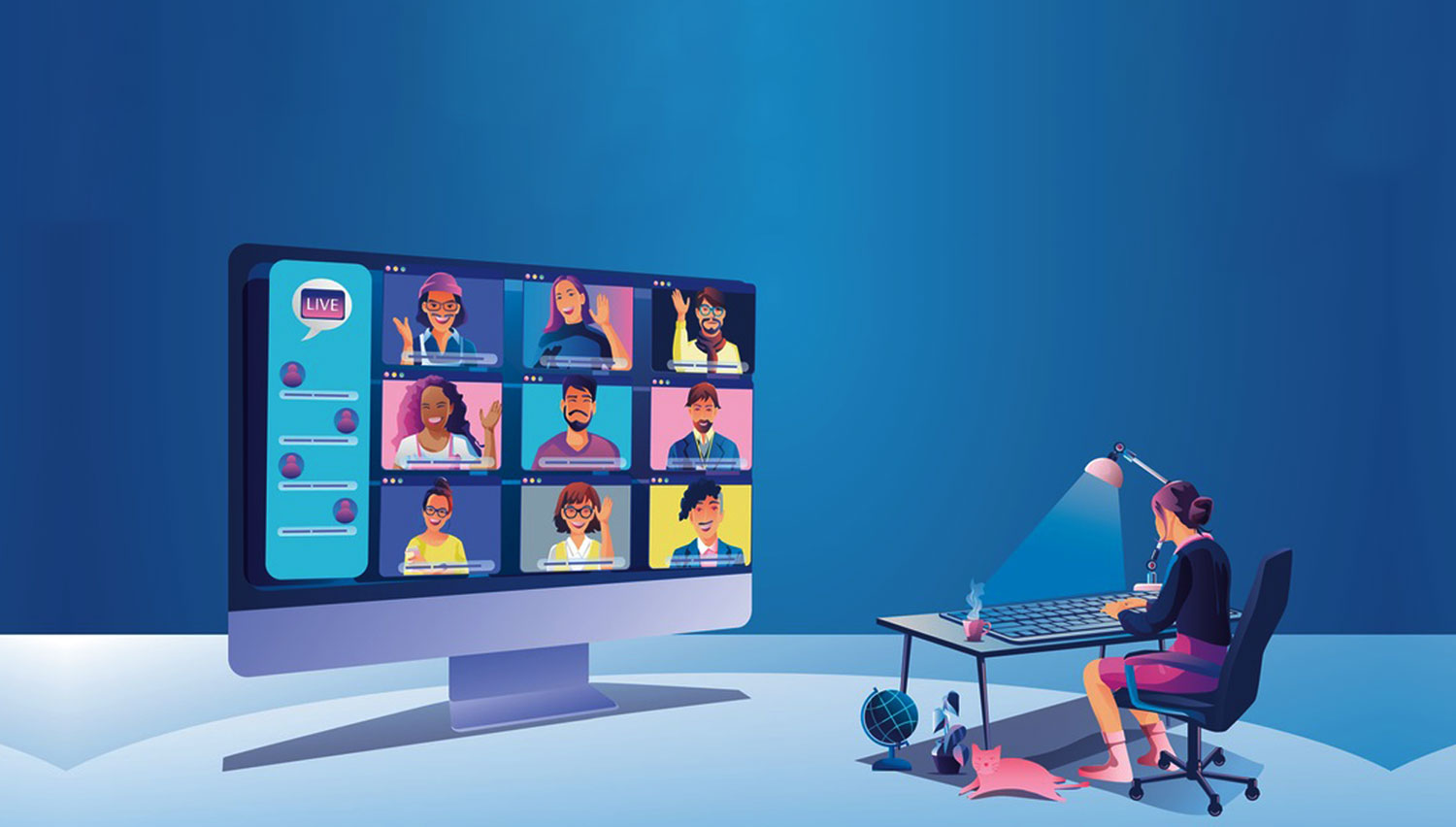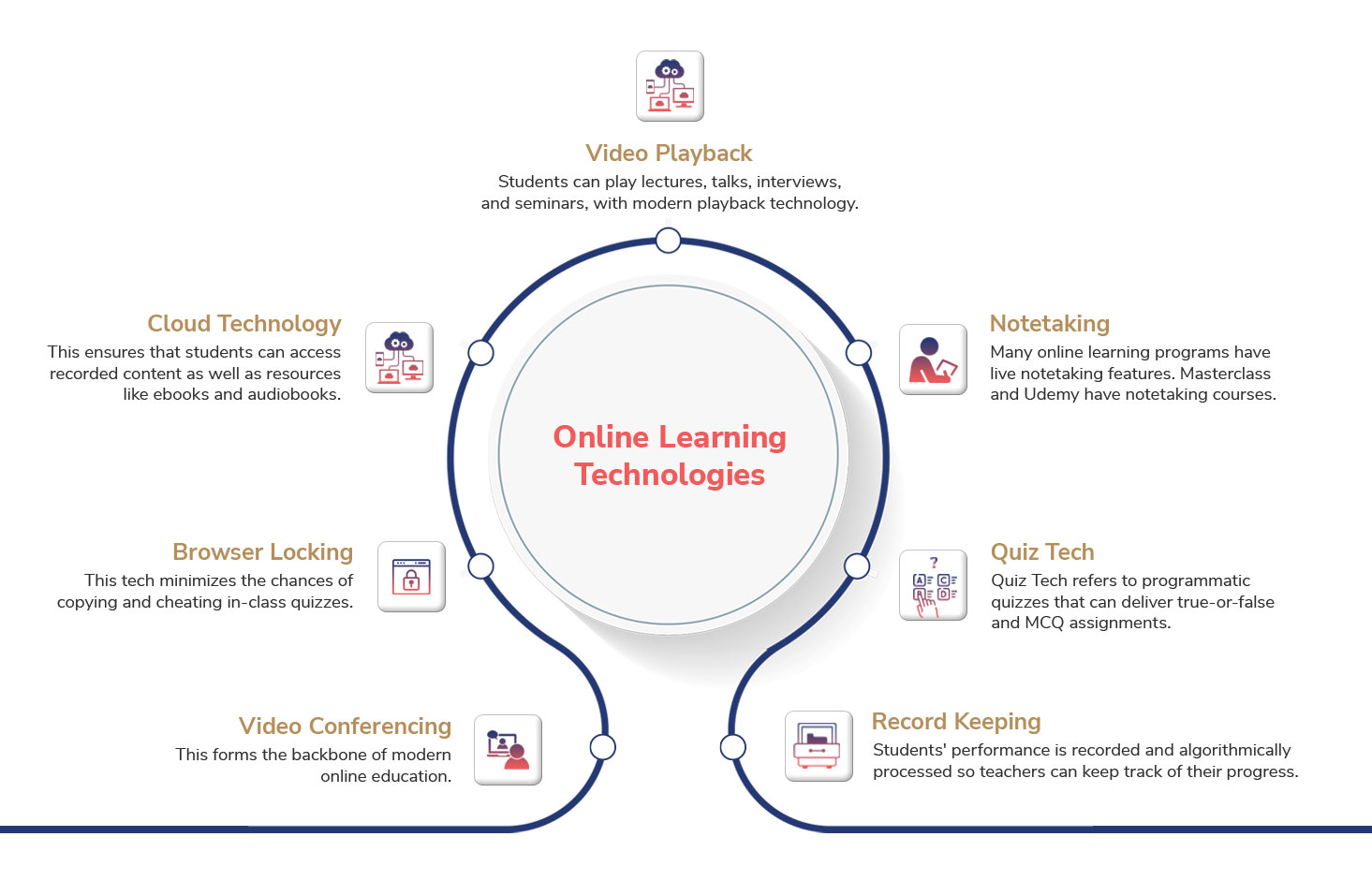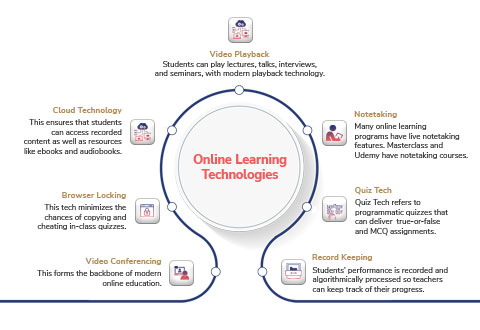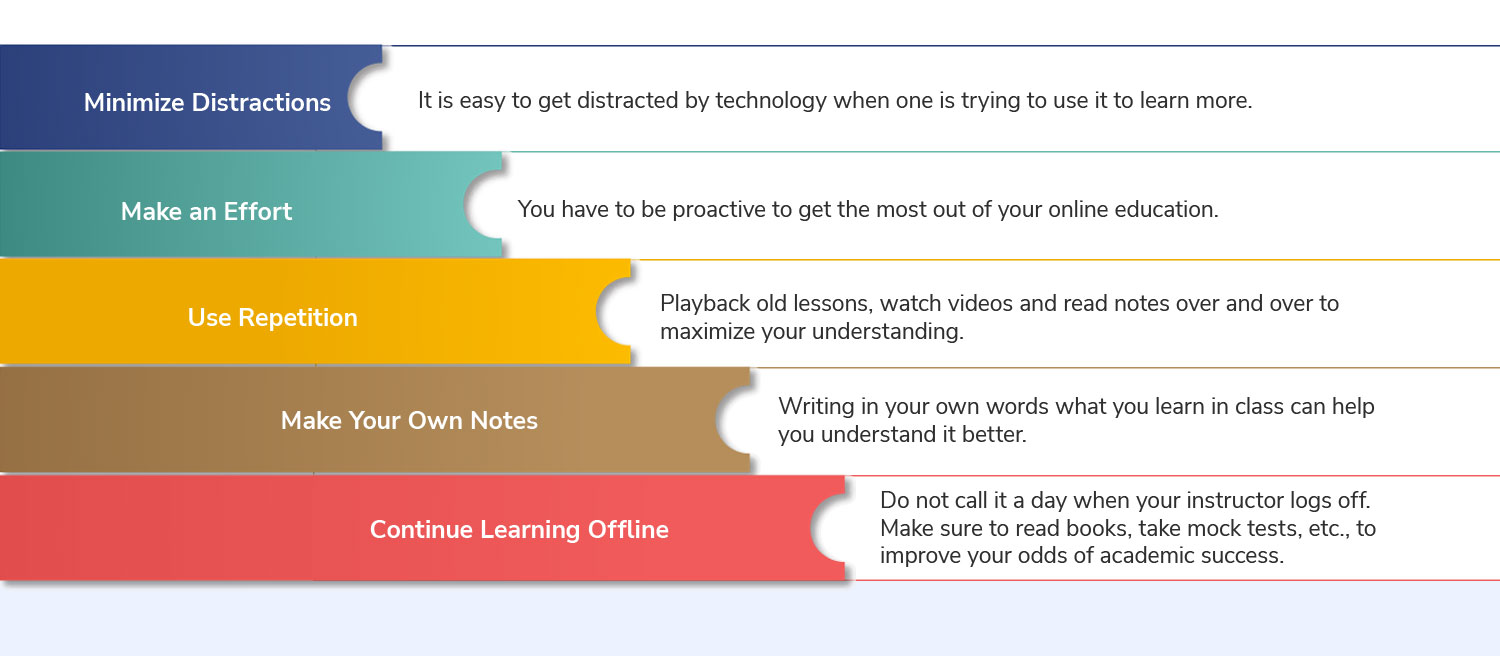Online learning is a term that covers remote education conducted over the internet. The education materials are delivered online, mostly in a live setting. Prior to the lockdowns of 2020 and the consequent remote education measures in modern academics, online learning was in non-academic settings.
People could learn crafts like making music, painting, and origami folding with the help of online instructors. More formal education was reserved for the classroom. The closest one could get to the remote education environment today was through resources like Khan Academy. Libraries of recorded instruction could be used for self-study and independent learning.

Some people consider learning from online content libraries a part of online learning. This definition, though technically true, is no longer reserved for self-study via online resources. Students using Google Scholar and the internet to access digital copies of journal articles aren't considered to be engaging in online learning.
Similarly, students using khan academy and similar online video platforms for self-study shouldn't be considered to be engaging in online learning.
Online learning in 2023 refers to the delivery of quality education online at your fingertips with the help of an educator in the presence of a curriculum. The definition of online learning might have shifted since 2020 and the advent of remote education, but online learning resources still remain relevant.
Previously, engaging in independent studies with the help of online resources was considered online learning. Now, online learning refers to a school education provided online. The modern approach adds instructors, examinations, and curricula to previously unstructured online resources.
In fact, many of the perceived drawbacks of online learning are related to what online learning used to be before live remote instruction became a staple in it. In 2023, online learning resources are only one part of remote education. A strong curriculum, alongside a recognized grading system and live instruction, makes up the entirety of contemporary online education.

Online Learning Platforms can be used for independent self-study, in-person education, and online learning. The resources shouldn't be confused with online learning itself. Suppose your child is in a classroom where the lesson of the day is regarding communication, and the teacher plays a Youtube video featuring a noteworthy communicator. In that case, the child isn't engaging in online learning. However, he is using an online learning resource.
Similarly, if your child is doing homework and wants to gain clarity regarding a mathematics concept, he could use the internet. But just because your child searches, "What is PEMDAS?" online doesn't mean he is an online learner. He might use an online resource for self-study, though. Most students past primary school use one or more online resources for their traditional education. That's why you should make a note of valuable learning resources even if you're not sure about enrolling them in an online learning program. Online learning platforms can be helpful in traditional education, self-study, and online learning. Let's look at some of these resources.
Khan Academy is one of the oldest online learning resources on the internet. It is also one of the earlier iterations of recorded education that has more of an academic lean. Khan Academy is backed by Google and Bill and Melinda Gates Foundation. It started off as a library of instruction material.
Read MOREWhere Khan Academy lacks a certification process, edX fills the gap with certificates backed by academic institutions and their offices. edX has multiple courses that students can take for free. If they want to be tested and given certificates for their performance, they have to pay for the courses they take.
Read MOREStarted with the backing of an academic association at Stanford, Coursera has grown to become one of the largest online learning resources in the world. In 2023, Coursera offers courses and credentials in over a hundred disciplines across thousands of courses. Among its partner institutions and collaborators are Illinois, Duke, Penn, and Imperial College London.
Read MORENow that you know about the top online learning resources, you are in a better position to understand how it differs from online learning itself. Before getting into a case comparison, let's go over a brief round-up of how online learning works.
Online learning works with the help of a remote education curriculum. The instructor provides live instruction, and the student uses online learning resources for reference and further research. The student is judged on his performance in remote exams, quizzes, and tests.
Before getting further into the specific aspects of online learning's method of operation, let's separate it from online learning resources. A textbook is a resource. A teacher can use it in her classroom to teach your child. You can use the same textbook to teach your child at home. In both cases, the resource is the same, but the mode of education is different.
Similarly, online learning resources can be used in different modes of education. TED Talk videos are played in classrooms, used by homeschooling kids, and are referenced in remote education. What separates online education in 2023 isn't the fact that it uses online resources.
What separates this education mode from conventional education are three factors: live online instruction, the presence of an academic curriculum, and remote examination. The last aspect is the most difficult to implement, making quality online learning institutions like 21K School quite rare.

The first pillar of online learning is the curriculum. The stronger this pillar is, the better the overall quality of the education your child receives. The curriculum is so important that US schools have collectively spent over $480 billion on curriculum management alone. This is derived from the $800 billion total spending figure and the 60% average that goes toward curriculum management.
In online learning, you must filter schools by their curriculum quality. If you like to give your child a world-class education, choose a school that has a globally recognized curriculum. British and American curricula are considered versatile in their university admission potential. The national curriculum in any given country holds value within its geography and sometimes beyond it as well.
Indian national curriculum has reliable admission potential in Malaysia, UAE, and China. British Curriculum has a broader scope in the gulf universities as well as the European ones. American curriculum has high international acceptance and equivalence standards. Any school that offers these curricula is a great starting point for a future-proof remote education. Even if your plans change in the future, the standardized curriculum progress of your child will help him transfer to other schools and ultimately to a university.
Most parents know well before they enroll their children in any school that a curriculum is as good as the teacher teaching it. Often, the parents recall their experience and understand the gap between an instructor's ability and the depth of the syllabus.
The most important pillar in online learning is live instruction. In its absence, education via online resources is nothing more than self-study. Online learning offers real education with real-time involvement. A good online learning institution recruits instructors who have the ability to communicate complex ideas remotely. In 2020, many classroom instructors had to learn how to deliver instructions remotely.
A study found that over 60% of the instructors delivering online instruction experienced moderate stress. This mode of instruction can be frustrating and mentally exhausting for teachers who aren't familiar with it. A good online learning institute recruits teachers who are comfortable with remote instruction.
In contrast, a conventional school might force its classroom instructors to play the part of a remote educator, which can create a stressful environment. A capable classroom instructor can help your child feel comfortable, understood, and cared for. When choosing an online learning school for your child, you should ask if its instructors have at least two years of experience in remote education.


Homework is an important part of a student's academic progress. It instills discipline, self-regulation, and independent learning capabilities in a student. Homework assigned by an online learning institution isn't too different from one assigned in conventional schools.
Remote instructors, however, have the advantage of including links and references in the homework instructions. Technology is grandfathered into the online education space, which allows students to receive direct references and access to online media for self-education.
Here’s how students / parents can view and submit the homework on the new 21K School Learning Portal: 21K Learning Portal Homework Module | 21K School
Homework can also be assessed remotely with ease and speed, saving paper, time, and energy.
Read our guide on 10 Easy Ways To Tackle Homework.
Homework is assessed by teachers regardless of the mode of education. Students need the incentive to finish their homework, and in the absence of progress testing, young students can see no need to conduct research, memorize lessons, or understand concepts.
Online schools have reliable student testing models. These help instructors gauge the progress of their students across their independent learning assignments as well as their in-session understanding. These tests can count towards a student's final grade. Most online schools have controlled-environment exams that are different from casual homework marking. The higher the certifying authority of a school, the stricter its exam conditions are.


Online learning institutions can range from unaffiliated establishments like ATS University to accredited schools like 21K School. Where ATS University prides itself in not being affiliated with any traditional education structure, 21K School markets its breadth of globally recognized curricula that include British and American ones. When enrolling your child in an online learning institution, you should check the type of certificate, diploma, or degree they can get at the end of their education period.
The aspects covered above are the key pillars of online education. Remote instruction and online delivery of course contents, however, make up the core of online learning. Without it, one can self-study online. Self-studying online or being homeschooled with the help of online learning resources are two options that bear some benefits of online learning.
But innovational online learning experience is considered superior to self-study and homeschooling with online media. Understanding the importance of online learning is therefore crucial for parents looking for alternative education modes.

The first pillar of online learning is the curriculum. The stronger this pillar is, the better the overall quality of the education your child receives. The curriculum is so important that US schools have collectively spent over $480 billion on curriculum management alone. This is derived from the $800 billion total spending figure and the 60% average that goes toward curriculum management.
In online learning, you must filter schools by their curriculum quality. If you like to give your child a world-class education, choose a school that has a globally recognized curriculum. British and American curricula are considered versatile in their university admission potential. The national curriculum in any given country holds value within its geography and sometimes beyond it as well.
Indian national curriculum has reliable admission potential in Malaysia, UAE, and China. British Curriculum has a broader scope in the gulf universities as well as the European ones. American curriculum has high international acceptance and equivalence standards. Any school that offers these curricula is a great starting point for a future-proof remote education. Even if your plans change in the future, the standardized curriculum progress of your child will help him transfer to other schools and ultimately to a university.

Most parents know well before they enroll their children in any school that a curriculum is as good as the teacher teaching it. Often, the parents recall their experience and understand the gap between an instructor's ability and the depth of the syllabus.The most important pillar in online learning is live instruction. In its absence, education via online resources is nothing more than self-study. A good online learning institution recruits instructors who have the ability to communicate complex ideas remotely. In 2020, many classroom instructors had to learn how to deliver instructions remotely.
A study found that over 60% of the instructors delivering online instruction experienced moderate stress. This mode of instruction can be frustrating and mentally exhausting for teachers who aren't familiar with it. A good online learning institute recruits teachers who are comfortable with remote instruction. In contrast, a conventional school might force its classroom instructors to play the part of a remote educator, which can create a stressful environment. A capable classroom instructor can help your child feel comfortable, understood, and cared for. When choosing an online learning school for your child, you should ask if its instructors have at least two years of experience in remote education.

Homework is an important part of a child's academic progress. It instills discipline, self-regulation, and independent learning capabilities in a student. Homework assigned by an online learning institution isn't too different from one assigned in conventional schools.
Remote instructors, however, have the advantage of including links and references in the homework instructions. Technology is grandfathered into the online education space, which allows students to receive direct references and access to online media for self-education. Homework can also be assessed remotely with ease and speed, saving paper, time, and energy.

Homework is assessed by teachers regardless of the mode of education. Students need the incentive to finish their homework, and in the absence of progress testing, young students can see no need to conduct research, memorize lessons, or understand concepts.
Online schools have reliable student testing models. These help instructors gauge the progress of their students across their independent learning assignments as well as their in-session understanding. These tests can count towards a student's final grade. Most online schools have controlled-environment exams that are different from casual homework marking. The higher the certifying authority of a school, the stricter its exam conditions are.

Online learning institutions can range from unaffiliated establishments like ATS University to accredited schools like 21K School. Where ATS University prides itself in not being affiliated with any traditional education structure, 21K School markets its breadth of globally recognized curricula that include British and American ones. When enrolling your child in an online learning institution, you should check the type of certificate, diploma, or degree they can get at the end of their education period.
The aspects covered above are the key pillars of online education. Remote instruction and online delivery of course contents, however, make up the core of online learning. Without it, one can self-study online. Self-studying online or being homeschooled with the help of online learning resources are two options that bear some benefits of online learning. But online learning is considered superior to self-study and homeschooling with online media. Understanding the importance of online learning is therefore crucial for parents looking for alternative education modes.

Online learning is important because it brings the benefits of online education to the broader public. Children who do not live close to world-class schools can get a world-class education. There are plenty of secondary benefits of online learning, but the primary perk of this learning method is the one that sets it apart from traditional classrooms.
For most people, the most relevant advantage of online learning is its accessibility. But does that mean such learning modes are irrelevant to you if you live near a good school? Perhaps. Understanding all the advantages and disadvantages of online learning is highly recommended. Once you understand these, you're in a better position to decide whether online learning is right for your child.

As mentioned earlier, a better understanding of the pros and cons of online learning will help you make an informed decision regarding its utility. Different parents are in different situations, and only when the key perks of online education outweigh its drawbacks for their context should they enroll their child in an online school.
Online learning's advantages revolve around its accessibility and the convenience it offers. Let's take a look at these benefits in detail. Here are the main advantages of learning online.
The student can learn without having to leave his home. This reduces commute stress as well as the limitation of enrolling in schools as good as the ones your city has to offer.
Online learning institutions are a lot more malleable in their scheduling and teaching considerations.
Because online learning is cheaper to implement and deliver, it comes at a relatively lower fee. Moreover, you save money by cutting the commute to a physical school. Visit the following link for a detailed break up of our fees:
- Indian Curriculum Fees
- Amercian Curriculum Fees
- British Curriculum Fees
Online schools can have varying classroom sizes. In some instances, one teacher works with less than a dozen students, maximizing the attention each pupil gets.
This advantage is also valid for homeschooling with online resources and self-studying. Online learning's schedule is far more student-driven than that of traditional schooling.
Here’s the Schedule of Live Classes for 21K School:
- Indian Curriculum Batch Timings
- American Curriculum Batch Timings
- British Curriculum Batch Timings
The academic pressure on a child can feel excessive when he is isolated from his parents and present in a classroom. This pressure is reduced in online schooling because online schools are forward-thinking and do not perpetuate traditional education's toxicity. More importantly, the pupil is at home, which gives him fewer reasons to be stressed.
Online learning balances instructor-driven education with independent learning. This two-pronged approach to academics can improve child's motor and cognitive skills in the long run.
Because online education is more flexible and offers the benefits of personalised learning, it makes room for all types of learners instead.
As is evident from online learning resources, this mode of education is more up-to-date with industry needs and offers access to skills and education materials that conventional academics are too slow to incorporate.
Online learning allows masters, experts, and authorities to give guest lectures across multiple institutions simultaneously. As a result, the pupil can directly learn from industry leaders.
Online learning lacks enforcement potential from the instructor side. This makes the child more accountable, provided that a parent fills the enforcer's role when the child doesn't step up.
There are several online education opportunities within different hobby class ideas like crafts, including music production, visual arts, and dancing.
While learning over the internet does test your ward's concentration, it also builds up their ability to focus over a long period.
Studies have found commuter stress to be a valid mental burden. You can minimize it by using learning-from-home opportunities like online education.
The social aspect that is often missing from homeschooling is present in remote education. Moreover, the possibility of its negative side effects like bullying and peer pressure are minimized when one is learning online.
Online learning lacks enforcement potential from the instructor side. This makes the child more accountable, provided that a parent fills the enforcer's role when the child doesn't step up.
There are several online education opportunities within different crafts, including music production, visual arts, and dancing.
Online learning requires regular communication, which improves the pupil's vocabulary, speaking confidence, and overall communication quality.
Online learning lacks enforcement potential from the instructor side. This makes the child more accountable, provided that a parent fills the enforcer's role when the child doesn't step up.
Disadvantages of Online Learning
While online learning has plenty of benefits, it is far from becoming the primary mode of education in 2023. The reason schools don't all switch to online education delivery is that this mode has some drawbacks.
The greatest disadvantage of online learning is that students have to spend more time staring at screens. This can be offset by audio lessons, breaks between classes, and better screens.
Not every area has the same internet speed. Moreover, the areas that benefit from remote education the most are the ones that have the most tech problems, like electricity outages and slow internet.
Online socialization cannot replace in-person socialization. The sense of isolation from having online classmates can be offset by making friends in one's neighborhood.
Also read our guide on how to make friends in an online set up.
This drawback is relevant to the school more than the student. Not all teachers are equally capable of delivering lectures remotely. Teachers must be trained to be good at teaching online.
Because students who learn online also end up spending their time off online as well, their total screen time can get hard to manage.
Here are 5 Screen Time Rule For Kids to improve their situation.

In most cases, online learning is delivered remotely by a live instructor alongside links to pre-recorded lectures for reference. A part of the online learning happens at the student's own pace, while another part happens with a live instructor on the other end. The extent to which lectures are delivered live or as recorded transmissions can vary from school to school. But in most cases, online learning is assessed the same way.

Classroom quizzes can be automated as long as they have binary answers. This allows online learning to incorporate frequent Multiple Choice Questions (MCQs) and True or False assignments after individual classes to assess a student's participation and understanding.
Most online schools have conventional examination centers or live exams conducted online with a browser-locking widget. In either case, the student is unable to cheat or copy answers. Once the assignment is turned in, it is marked like conventional academic assignments.
At a bare minimum, a video conferencing app is used for online learning technology. But average online learning institutions have a more robust school tech stack that ensures quality control, academic compliance, and student engagement.


Online education's technological improvement is directly correlated with how seriously it is taken in the world today. Professional diplomas and certifications earned online have supplemented CVs for nearly a decade. But recently, there have been leaps in recognition of online qualifications.
Most Grade 10+ boards in the world have established centers where examinations can be held. These centers do not discriminate against students who have learned online. A pupil who has completed his education with an online learning institution like 21K School has the same opportunities as a student who has completed the British, American, or Indian curriculum in a conventional school.
Curriculum
British Curriculum
American Curriculum
Indian National Curriculum
Bachelor's Degree (British)
Bachelor's Degree (American)
Bachelor's Degree (Indian)
Master's Degree (British)
Master's Degree (American)
Master's Degree (Indian)
Professional Certifications (soft skills)
Professional Certification (technical)
Recognition
Standard recognition, with in-center exams
Standard recognition, with in-center exams
Standard recognition, with in-center exams
Limited to specific degrees, with online exams
Limited to specific degrees, with online exams
Limited to specific degrees, with online exams
Limited to broader degrees, with online or in-center exams
Limited to broader degrees, with online or in-center exams
Limited to broader degrees, with online or in-center exams
Standard recognition, with online assessment
Limited recognition, with in-person or online assessment
As you can see, online learning opportunities can range from KG-level education up to Masters and beyond. The following student checklist for online classes can help one study online regardless of education level.

Minimize distractions
It is easy to get distracted by technology when one is trying to use it to learn more.
Make an effort
You have to be proactive to get the most out of your online education.
Use repetition
Playback old lessons, watch videos and read notes over and over to maximize your understanding.
Make your own notes
Writing in your own words what you learn in class can help you understand it better.
Continue learning offline
Do not call it a day when your instructor logs off. Make sure to read books, take mock tests, etc., to improve your odds of academic success.
21K School combines the recognition of conventional schooling with the benefits of online learning. It provides world-class education to students around the world regardless of their proximity and ensures that they have the opportunity to earn a British, American, or Indian national curriculum certification recognized by a wide range of universities all over the world.
Simply put, skill-based online learning with 21K School ensures that your ward gets the best education that is not only recognized by academic institutions but is also up-to-date with the current times.

If you use 21K School's savings calculator, you will notice that almost every in-person schooling choice is more expensive than 21K School. And this difference becomes more prominent when you start looking at schools with equivalent education quality.

21K School has a 96% approval rating among parents of its current and past students. The school has over 7,500 students, making it one of the few online education providers with strong proof of performance. We are loved by parents, students, and the larger community who believe in quality education. Our online school reviews are the best social proof we can get!

One does not have to be in a specific geographic location to enroll in 21K school. The accessibility of this school’s education delivery is as wide as internet coverage allows it to be. Moreover, the school’s curriculum equips students to give exams in board-backed examination centers all around the world.

21K School has strategic Affiliations & Accreditation that is globally recognized as equivalent to some of the leading in-person education providers.

21K School is trusted by parents all over the world. Its current student body features over 68 nationalities and students from 75 countries.
Learn more about What makes 21K School’s Online Program stand out here.

Feel free to ASK...